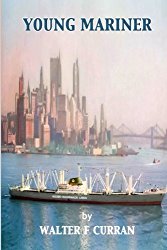- (0)
- 8
May -
Author : Walter F. Curran Category : Published Works, Short Stories
Tags : Fiction, Short Stories
Fiction – Eastern Shore Writers Association, Bay to Ocean 2018
An eight-year-old girl, large for her age adorned with curly, brown-blond hair and amazing blue eyes asked me, “Granpa, is that a real museum?”
If not for that question the link to my grandfather would have been forever lost. It has taken one hundred and eighteen years, five generations, to make the connection.
The Rehoboth Beach Historical Society building was on the far side of the parking lot of the playground I had taken her to.
“Yes, it is. Want to see it?”
“It’s small.” Her only prior experience being the Smithsonian with her parents.
“Museums are like people. They come in all sizes and shapes and if you pay close attention, they’re all interesting.”
Jumping up, she grabbed my hand. “Let’s go.”
“Granpa,” pointing at a photo of a Tern Schooner beached, port side to the shore but laying to starboard, and stranded in Rehoboth circa October 1899, the name on the stern obscured by a breaking wave slamming the starboard quarter, my granddaughter asked, “What’s the name of the boat?”
Peering closer, “Falmouth something or other.” I replied. Noticeable on the port quarter is a solitary figure, gazing ashore. Until today it and he were a mystery, stuck in time.
When we left the museum, we walked back to the park, hand in hand, youngster leading old man, and sat on a bench. “Did you like the museum,” I asked?
“Yes,” breathing excitement. “I could get close to everything. Some of those people photos look like the one you have on your office desk.”
“They sure did. Which one did you like best?”
Jumping up, she stood in front of me. “I liked them all but the boat on the beach made me sad.” Pausing, she peered at me and said, “You looked at it a long time. How did it get there?”
Leaning close, I patted her hair gently, “I’ll tell you what. Let’s go home and look at the photo on my desk and I’ll tell you a story about it.”
The photo on my desk is that of a tall, stern looking seafarer next to a large woman, dark-skinned, bearing an impish smile. It sits atop a logbook, used as a personal diary. Handing her the photo, I picked up the logbook. “My father, William Warren Coakley, II, gave me these. My grandfather wrote the logbook. It’s an amazing story,” and I began to read.
They used to call me “Lucky Bill.” Not anymore. I am the captain of the Falmouth Maiden. At least I used to be when it was afloat. She’s no longer a maiden either after the savage manner in which the storm ravaged her. Now she and I are both stuck on this damned beach called Rehoboth and I’m reduced to sentry duty trying to protect the owner’s ship and cargo.
Born William Warren Coakley in the year 1866, the last of seven children of Lauren and James Coakley of East Boston, I am the only surviving member of the family. Destined for the sea from the day of my birth, my first job at age eight was a cabin boy on a dilapidated harbor tug. From there, over the course of the next seven years, I worked on various coastal freighters as a deckhand and bosun, studying navigation and reading every book I could with the help of a couple of mates and captains I sailed under. At the ripe age of sixteen, when on a trip in the Caribbean, the mate, Abraham Carney, took sick and died. After the burial, we couldn’t carry a body for another two weeks, the captain, a stern but fair man, called me to his cabin.
“Coakley, you’re young but capable and seem to be made of stern stuff. If you can pass my navigation exam, I’ll let you replace Mr. Carney as Mate, at least for the remainder of this voyage. What say you?”
Dumbfounded at the offer I replied, “I’ll do my damndest captain!”
For hours, the captain posed questions, and I responded. I surprised him at the depth of my knowledge on the ocean currents. As the evening ended, he called the crew together and informed them I had passed his queries, I was now Mate and they will obey my orders and treat me with the respect warranted.
I stayed with that captain for four years then transferred to another coaster owned by the same company. At the age of twenty-four, I got my first chance as captain and now, at age thirty-three, forlorn, I stare at the stretch of beach, pondering my fate. I wondered if I would ever again command a ship.
A Tern schooner, a hardy three-master of four hundred tons, rigged fore and aft, The Falmouth Maiden was well equipped for the coastal and Caribbean trades as we made our way to New York with a cargo of lumber.
We rode the Florida current north with winds from the west-northwest until Cape Hatteras and went offshore to stay in the Gulf Stream. Due east of Norfolk, Virginia with the wind easing and shifting toward the northeast we went on the starboard tack and sailed northwest by north which, if the weather held, would take us close to the mouth of the Chesapeake Bay. At that point, depending on the wind, we’d have to tack again and push east-northeast paralleling the shore to the mouth of the Delaware Bay. With luck we could keep that course all along the New Jersey shore and thence into New York.
Leaning on the taffrail, savoring the salt air laced with the smell of fresh-hewn lumber in the cargo hold, I reflected on how hard work and luck had taken me so far from my beginnings.
Within hours of tacking to the northwest, the clouds thickened. Rain and higher winds soon followed. By the end of the afternoon watch, seas were rising.
With seas at twenty feet and gusts estimated at forty knots, a full gale, I ordered all hands, seven crew members and a cook to reef the topsails and take in the flying jib. Even with reduced sail, the gusts were heeling the ship hard over. Four bells into the first watch I called the crew out again, took in all topsails, the forward staysail and after staysail.
The barometer dropped. Near sundown it read 29.2 inches, and judging by the state of the seas, dense foam streaking from the crests, I estimated the wind steady at forty-five knots with gusts much higher but the old girl had been through similar storms and weathered them well.
I have sailed through such weather many times, yet, now I was nervous, a strange feeling, tightening my shoulders and clawing at my gut. What was different? A foreboding? Weather is unpredictable and fickle so a prudent captain is always tense in severe weather, yet…?
When the wind rotated from North East to East by North, I realized the Falmouth Maiden was riding the front edge of a hurricane. A mariner’s nightmare, strong onshore winds close to land.
Navigating by dead reckoning since taking the noon sun-line, the constant change in wind direction made it difficult to gauge leeward drift toward land in such heavy weather. Confident in the past, perhaps overly so, this apprehension was foreign, a nagging wind tugging at my mind, distracting and unsettling.
For now I held fast steering North by East as the wind grew stronger, the sky darker and the seas angrier. Not a church-going man, I said a prayer for the safety of all aboard.
Over the next six hours the wind shifted more to the North. The eye of the storm was moving out to sea and passing us. Already behind in our delivery date in New York, knowing the owners oft-repeated mantra of “Time is money, your time our money,” I opted to keep on but reduced sail further by lowering the mainsail, reefing the foresail and mizzen sail, striking the regular jib and hoisting a storm jib in its place. We needed these three sails to keep the ship balanced and maintain steerage way. We were running nearly ‘barebones’. Even so, the wind was strong enough that the masts and rigging acted as sails and we made slow progress.
I planned to stand still in the middle of the ocean and let the storm pass on by. A fleeting thought, if you want to make God laugh, tell him your plans. Was God listening? Did he hear my earlier prayer? Was he laughing or benevolent tonight?
At the last change of sail I had taken over the helm. The cook, a woman named Syriana, dark skinned, curly hair, of unknown pedigree and Amazonian size, large but of perfect proportions, approached me and offered, in her lilting accent to go aloft and assist. With all seven men of the crew trimming sails, I was tempted to agree having seen her in the rigging from time to time and witnessed her agility. Instead, I let her take the helm and I went forward to assist lowering the mainsail. When I returned, I shouted, “Thank you for taking the helm,” something I never would say to a man.
Touching her forelock, she yelled back, normal conversation impossible in the screech of the gale, “For you captain, I’d do anything,” catching me by surprise. Such a sign of loyalty touched me but the personal implication was both evocative and troublesome.
“Granpa?” my granddaughter interrupted my soliloquy.
Peering over my glasses, I replied, “Yes.”
“What’s evocative mean?”
“It means that the captain found Syriana attractive.”
“Oh. Why was he troubles?”
“Good question. He was the captain and couldn’t get involved with a crew member.”
“Was she his girlfriend?”
Chuckling, “No, not yet. Let me finish the story,” and I resumed reading.
Syriana went below and I continued to wrestle with the helm, my thoughts now diverted. Syriana, near as tall as me, was strong, beautiful in a wild, winsome way and possessed a figure any woman would envy but her best feature, a delightful, impish smile. Intelligent, a collection of books hung in a net bag in the galley and a caring nature, treating minor ailments of the crew with tenderness.
Early in the voyage I had noticed two of the crew members playing “grab and poke” as she walked by, a game better suited for a tap room. I intended to call them aside but before I could, Syriana turned, hand on hips and glared at them. Not a word, just stared. They retreated, apologizing. Later I rebuked them, warning them she was a crew member first and foremost and they disrespect her at their peril. I am sure they felt I exerted a proprietary note, but they were wrong. While I admired her womanly attributes, the captain is the captain and can be nothing else when at sea.
Peering again over my glasses, I watched my granddaughter’s blue eyes go wide, and she nodded. I think she now understood “troublesome.” Adjusting my glasses, I continued.
With the seas now cresting at thirty feet and washing over the foredeck, I ordered the crew into the safety of the after main cabin where I could call down through the voice pipe if I needed them. As captain, I felt it was my responsibility to steer the ship in these extreme conditions but ordered a standby helmsman with me. No one should ever be on deck alone in heavy weather. We both tied off at the waist to a safety line rigged the breadth of the ship between the taffrails.
Syriana came up with the seaman on the first shift and brought me a tankard of hot tea. As she handed me the tankard, her hand lingered on mine, long enough for me to look into her eyes and see her smile. It was a warm beacon in this dank, dangerous night.
As the night wore on, I tried to beat upwind as best I could, knowing we were losing ground to the west, towards landfall.
Bone tired, shoulders aching from grappling with the wheel, I got a spot of relief when Syriana came up again three hours into the watch bringing me victuals. Ordering the seaman to take the helm and her to stand by, I sat on the deck, pelting rain and sea spray tattooing my back as I braced myself against the leeward side of the binnacle. Syriana moved to the windward side of the binnacle, opened her slicker, leaned over and enveloped the binnacle, offering some protection from the rain as I ate the biscuits and salt cod and reveled in the smell of her.
Washing them down with another tankard of tea, I rose, handed the tankard to Syriana, then leaning against the binnacle, relieved myself downwind, both she and the salt spray indifferent and resumed my position at the helm.
I peeked at my granddaughter, wondering if she would comment on him relieving himself, but she either didn’t understand or didn’t care. No reaction, so I read on.
Dawn. Gray light revealed walls of spume-topped water assailing the ship. The gale, relentless, drove spray like nails into exposed flesh, hands raw and cold, face numb, eyes stung by salt. The ship shuddered and groaned from the relentless pounding of the thirty-foot seas.
I ordered the bosun to go forward and check the hatch covers to make sure they were tight. A man with a wife and seven children, I worried for his safety, but the ship comes first. I watched as he grappled his way forward and breathed a sigh of relief when he returned in half an hour saying all was secure and watertight.
Unsure, a rare feeling, I held steady for a few more hours, hoping the storm would move faster than us and the winds abate as we approached the Delaware Bay.
Near sunset, with the Delaware shore somewhere ahead, I called all hands on deck and prepared to tack. I let off a bit to allow the ship to pick up speed then threw the helm hard to starboard. The bow struggled to come around but stalled when direct into the wind. We slid back, and I turned the helm hard to port hoping the rudder would provide guidance and help push the bow to starboard but it wasn’t to be. Twice more we tried to tack and failed. Calling the crew back to the helm, I told them I would jibe the ship around, cautioning them how dangerous this maneuver could be, stressing that the timing must be perfect.
With Syriana beside me at the helm I bore off to port, now on a close reach, the ship picking up speed. As I continued the turn downwind, I saw, too late, there were two problems. First, the foresail boom was rising. The downhaul had broken. Second, the crew had slacked off the sheets on the mizzen too much. As the foresail boom came around, the strain was too much and it snapped. Then the sheet itself snapped. Within minutes there was nothing but rags where the foresail used to be and the remains of the boom, splinters washing about in the scuppers.
Now, with only the mizzen to work with, dragging the stern to port, forcing us to stay on a starboard tack, I worried. As I pondered the situation, the panicked shouting of the crew came through.
“I see breakers ahead Captain!”
With that I knew the fight was lost. We had run too far west.
The line of breakers, just visible through the rain, stretched from the south to as far North as I could see. I told the crew I planned on laying the ship on the beach with the anchor forward and a kedge anchor aft, dropped to seaward in the hope we could pull ourselves off when the storm abated. The fear in their eyes mirrored my own thoughts but I dare not show it lest they become panicked, a deadly fault when circumstances require quick action.
Sending the Bosun and one man forward to the main anchor, I sent four other seamen to rig the kedge anchor. Stationing the last crewman at the storm jib with orders to release the sheet and let go the halyard the instant we let go the anchor, I instructed Syriana to stand by at the mizzen and do the same for that sail. As she walked away, she turned, smiled, nodded her head and continued on. My resolve hardened. Now I was saving Syriana and the ship.
My intent was to land the ship as upright as possible so the keel would take the main impact.
“Let go the anchors” I shouted, dropping my arm. Watching the breakers crash I shouted “Take a strain,” dropping my arm again. They acted in unison, tightening the lines on the bitts. As the anchors chewed into the seabed, I felt a slight drag, enough to pull the ship erect from her port list then she grounded. Thank God! It was sand.
The men from the Rehoboth Life Saving Station arrived and stood above the breaker line. Using a Lyle gun, a small cannon that shot a projectile with a light line attached, they aimed, shot and dropped the line dead on target. The Bosun retrieved it then tied off a heavier line the life saving crew hauled ashore. We rigged a block and tackle and attached their breeches-buoy with two pulling lines. Ordering the entire crew ashore, I stayed aboard. To a man, they all fled with no argument except Syriana. As the last one to go, she grabbed my head and kissed me, then climbed into the bosun chair, smiled and waved as the life station crew hauled her ashore. I stood, surprised at her effrontery yet pleased at the same time. All night, as the storm abated, I thought of that kiss, that devotion, that fortitude and vowed to not lose faith, despite the dour circumstances.
Once again, little blue eyes interjected, “She kissed him?” eyes wide, hand to her mouth, then giggled. I giggled too. “May I continue?” I asked and blue eyes nodded.
Heeled to port, beached but not broken, if the seams don’t split and if we can get tugboats, we may be able to drag her off the beach. Many “ifs” and small consolation, but enough for now.
In the morning light, with wind lessened and seas calming, instead of being in New York unloading our cargo, I stand sentry. There will be no one claiming salvage of the Falmouth Maiden. Ravaged she may be, but she’s still my maiden to protect and protect her I will.
Later than day, Syriana and the Bosun returned to the ship. After letting them aboard, I went ashore to find a telegraph and contact the owners. I instructed them to pull up the Jacob’s ladder and not let anyone else aboard.
After contacting the owners, returning to the ship at sundown, a goodly number of folks were milling about on the beach and asking questions, curious but polite and friendly.
Syriana fired up the galley stove. It was good to see Charley Noble, every sailor’s name for the galley smoke stack, belching smoke, a sign of life. After a meager meal of salted beef, biscuits and hot tea, the Bosun went to his bunk, and I retired to mine. A gentle rap on the door frame alerted me to Syriana’s presence.
“It’s warmer here than in the crew’s quarters, can I sleep on the deck?”
Knowing the answer should have been no, I acceded. Tentative at first, she told me about her background and how she came to be on board ships. From French Guyana, she ran away with her older brother from a drunken father, her mother having died when she was a year old and worked their way on a small ship to the Dutch Antilles. The captain, a Dutchman based in Barbados took pity on her and protected her from his roughneck crew. When they docked, he arranged for Syriana to stay with his wife and help her with their tavern. Being childless, the wife welcomed Syriana, and she soon loved this stranger showing her, for the first time in her memory, kindness and affection.
When Syriana was twenty, her adopted father was lost at sea with all hands, including her brother. Six months later, the mother died from an unknown disease. The local governor confiscated the tavern for unpaid taxes and Syriana worked her way as cook on a ship bound for America. She had been sailing ever since.
Fascinated, both by her and her tale, I listened and talked but lack of sleep over the last forty-eight hours caught up with me. I dowsed the oil lantern, she in her blanket and me in my bunk. The silence loomed like a cloud, yet comforting, knowing she was there only three steps away. As I drifted off, I heard, “My name is pronounced ‘Shiriana, Sh.’”
She awoke me with a tap on the shoulder. Pointing to the table, more tea and biscuits.
“Thank you Syriana,” emphasizing the “sh” and evoking that wonderful smile.
Reaching out for her hand I asked, “Why did you kiss me when you left the ship?”
“I wanted to,” defiant. Why didn’t you stop me?”
Pausing, “I didn’t want to,” and we both smiled.
The tugboats took two days to arrive. Two days in which we cleaned up the ship and replaced broken gear. Syriana and I enjoyed long, intimate nights.
Consulting with the tugboat captains, we agreed we would attempt to drag the ship off the beach in the afternoon of the spring tide, in two days time.
At 1515 hours, the height of the spring tide, with no wind and calm seas, both tugs each took mighty strains on two of the four mooring cables and with a sloshing groan, the ship came free of the sand. Three days later, with four new crew members aboard, we hoisted sail, heaved anchor and sailed for New York, the end of this voyage but the start of a new life voyage with Syriana.
I looked up, took off my glasses and said, “What do you think?”
Smiling that impish smile, blue eyes said, “Granpa, that was a wonderful story. Can we go for an ice cream cone now?”
Kissing the top of her head, “Yes Syriana, a great idea.”





